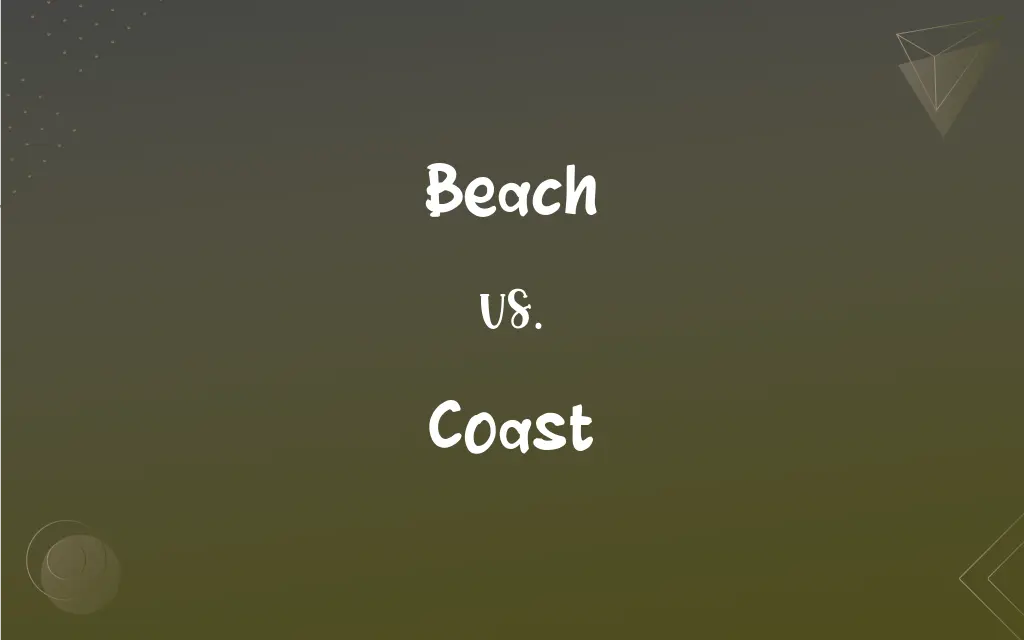Beach vs. Coast: What's the Difference?
Edited by Aimie Carlson || By Harlon Moss || Published on December 22, 2023
A beach is a narrow, gently sloping strip of land that lies along the edge of an ocean, sea, lake, or river, typically covered with sand or pebbles, while a coast is the broader area where the land meets the sea, including beaches, and cliffs.

Key Differences
A beach is a specific part of a coast, characterized by its sandy or pebbly shoreline. It's where land and water bodies meet, often visited for recreation. A coast, however, is a larger geographic area that encompasses not just beaches but also cliffs, bays, and the edge of the land along a sea or ocean.
Beaches are formed by the accumulation of sand and pebbles, often brought in by tides and waves. They are dynamic, changing shape with the movement of water. Coasts, on the other hand, include not only these sandy areas but also the geological formations like cliffs and rock formations that make up the boundary of land and water.
Beaches serve as habitats for various marine and bird species, playing a crucial role in coastal ecosystems. Coasts, encompassing a wider area, include various ecosystems, from sandy beaches to rocky cliffs, each supporting diverse flora and fauna.
Beaches are popular for recreational activities like sunbathing, swimming, and surfing. Coasts offer more, including ports for shipping, areas for fishing, and spots for tourism, thereby having a broader economic and social impact.
The conservation of beaches focuses on erosion and preserving their recreational value. Coastal conservation is more complex, involving the management of various ecosystems and protection against environmental issues like sea-level rise and coastal erosion.
ADVERTISEMENT
Comparison Chart
Definition
Sandy or pebbly shoreline
Land area meeting the sea or ocean
Composition
Sand, pebbles, shells
Beaches, cliffs, estuaries, bays
Size and Scope
Smaller, part of a coast
Larger area, includes beaches
Activities
Swimming, sunbathing, beach sports
Fishing, shipping, broader tourism
Environmental Concerns
Erosion, habitat preservation
Coastal erosion, sea-level rise, pollution
ADVERTISEMENT
Beach and Coast Definitions
Beach
The area of land that meets the sea.
The beach stretched for miles, lined with palm trees.
Coast
The land along the sea or ocean.
The coast was dotted with lighthouses.
Beach
A sandy shore of a body of water.
The children built sandcastles on the beach.
Coast
The edge of land bordering water.
The erosion of the coast has become a serious concern.
Beach
A pebbly or rocky area by a sea or lake.
We collected unique stones along the rocky beach.
Coast
A region near the shoreline.
Coastal towns often rely on fishing and tourism.
Beach
A landing area or zone on a coast.
The troops made an amphibious landing on the beach.
Coast
The boundary of land next to the sea.
We drove along the scenic coast road.
Beach
A recreational area near water.
They spent their vacation lounging on the sunny beach.
Coast
A zone where land meets the sea.
Coastal habitats are crucial for marine biodiversity.
Beach
The shore of a body of water, especially when sandy or pebbly.
Coast
Land next to the sea; the seashore.
Beach
The sand or pebbles on a shore.
FAQs
Are all coasts sandy?
No, coasts can be rocky, cliff-lined, or sandy, depending on the geography.
What is a beach?
A beach is a sandy or pebbly shoreline by a body of water.
Can a beach exist without a sea or ocean?
Yes, beaches can also form along lakes and rivers.
Are beaches important for ecosystems?
Yes, beaches provide habitats for many marine and bird species.
How are beaches formed?
Beaches form from the accumulation of sand and sediments, usually carried by water currents.
What is a coast?
A coast is the area where land meets the sea, including beaches and cliffs.
What causes coastal erosion?
Coastal erosion is often caused by wave action, currents, and human activities.
What activities are common on beaches?
Common beach activities include swimming, sunbathing, and beach sports.
Do all beaches have sand?
No, some beaches have pebbles, rocks, or shingle instead of sand.
Is beach erosion a natural process?
Yes, beach erosion is natural, but it can be accelerated by human activities.
How do human activities affect the coast?
Human activities can impact coasts through pollution, construction, and altering natural water flows.
What is the difference between a beach and a coast in terms of use?
Beaches are often used for recreation, while coasts have broader uses like shipping and fishing.
What is a coastal ecosystem?
A coastal ecosystem is a biological community located where the land meets the sea.
Can beaches be artificially created?
Yes, beaches can be artificially created or replenished through beach nourishment.
Can a coast change over time?
Yes, coasts can change due to natural processes like erosion and human intervention.
Why are coasts important for trade?
Coasts are crucial for trade as they provide ports and harbors for shipping.
Are beaches prone to pollution?
Yes, beaches can be prone to pollution from land-based sources and marine litter.
What is the main threat to coastal areas?
The main threats to coastal areas include sea-level rise, erosion, and pollution.
Do all countries have coasts?
No, landlocked countries do not have coasts.
What are coastal waters?
Coastal waters are the part of the ocean near the coast, often used for fishing and transportation.
About Author
Written by
Harlon MossHarlon is a seasoned quality moderator and accomplished content writer for Difference Wiki. An alumnus of the prestigious University of California, he earned his degree in Computer Science. Leveraging his academic background, Harlon brings a meticulous and informed perspective to his work, ensuring content accuracy and excellence.
Edited by
Aimie CarlsonAimie Carlson, holding a master's degree in English literature, is a fervent English language enthusiast. She lends her writing talents to Difference Wiki, a prominent website that specializes in comparisons, offering readers insightful analyses that both captivate and inform.






































































